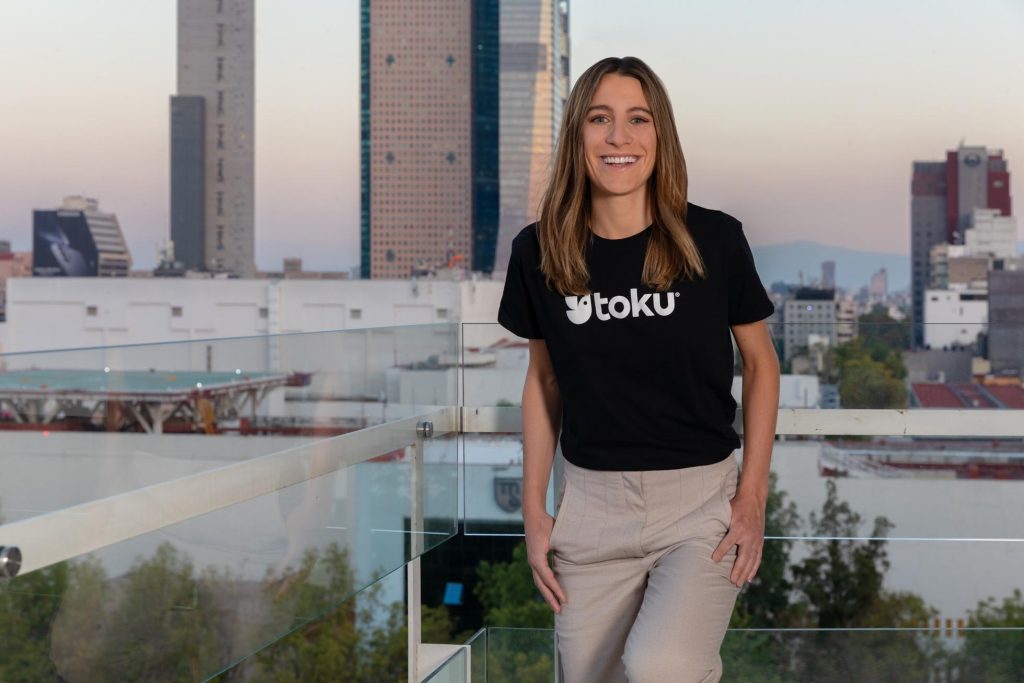Toku, a 170-person startup based in Santiago, Chile, has raised $39 million in new funding to make it easier for Latin American companies to accept and track the digital payments they receive from consumers. Founded five years ago by entrepreneur Cristina Etcheberry, Toku aims to do for business-to-business payments what Brazil’s Nubank has done for consumer banking: use technology to dramatically improve the outdated status quo in the region.
Fintech-focused venture capital firm Oak HC/FT led the new Toku fundraise, which values the startup at more than $175 million. Existing backers also invested, including F-Prime Capital, Gradient Ventures (Google’s investment fund), Clocktower, Y Combinator, Mexican VC firm Wollef and Brazilian VC Honey Island. The $39 million in Series A funding comes a year after Toku received $9 million in a Simple Agreement for Future Equity (SAFE) fundraise, where no valuation was set. That $9 million investment will now be converted into Series A stock, and Toku is combining the two financings into a $48 million Series A round.
According to PitchBook, it’s the largest Series A fundraise ever by a female-founded technology startup in Latin America. The closest runner-up was a $35 million fundraise in December 2021 by Mexican corporate spend management startup Mendel.
Similar to payment giant Stripe’s fast-growing Billing product, Toku helps businesses with features like accepting consumer payments, sending payment reminders and signing up consumers for auto-pay. It first launched in 2023 in Chile, followed by Mexico and Brazil, and has 475 medium-sized and large businesses as customers. So far, it has targeted companies in five industries: insurance, lending, real estate property management, education and utilities.
This year, Toku has reached slightly more than $10 million in annualized revenue, roughly doubling from a year ago, and has spent just $11 million in investment capital to get there. Such capital efficiency is much better than that of most fintech startups, according to Rocio Wu, a Toku investor and board member, and Allen Miller, a partner at Oak who led the new Toku investment and is also joining the startup’s board.
Have a story tip? Contact Jeff Kauflin at jkauflin@forbes.com or on Signal at jeff.273.
Growing up in Santiago, Chile, Etcheberry started learning about the intricacies of payments as a teenager. Back then, a consortium of banks called Transbank was the only payment processor in the country. But in 2007 her father, Javier Etcheberry, who had previously led the Chilean government’s Internal Revenue Service, started his own payments company.
“My dad was the first one that challenged this monopoly. So I grew up learning about the problems in the current payments infrastructure,” says Toku’s 32-year-old CEO. Her father’s business, originally called Multicaja and later renamed Klap, has gone on to grow to 500 employees and processes more than three million transactions a day for a 9% share of the payment processing market. (Last year, Javier Etcheberry left Klap and was reappointed as the head of Chile’s Internal Revenue Service.)
Before founding Toku in 2020, Etcheberry worked as a product manager at Latam Airlines, where she worked on projects like leading the airline’s integration with Amazon’s Alexa in Brazil. When she started Toku with cofounders Francisca Noguera and Enzo Tamburini, her father wrote the first check to get the startup off the ground.
The payments processing market in Latin America is highly fragmented and vastly different from the U.S. market. Ninety-five percent of businesses process payments through local banks, Etcheberry says, and American fintechs like Stripe and Adyen have little market presence there. Payment methods differ by country, and Latin American consumers don’t use credit and debit cards as much as Americans do. For example, in Brazil, paying through your bank account with the country’s high-speed Pix system is extremely popular. Mexico has its own Pix-like rails called Spei. Oak’s Allen Miller says that many elements of payments in Latin America are “very regional-specific, where a U.S. competitor cannot come in and recreate this overnight.”
Toku’s software has a few features that aren’t currently offered by the incumbent-bank payment processors. First, it helps businesses more easily accept payments from multiple processors. Transactions fail more often in Latin America than they do in the U.S., causing businesses to manually contact customers to collect. Toku’s software can route payments to multiple processors so that, if a transaction drops with one, it can quickly move to another to try to complete the payment.
Second, it tracks businesses’ incoming payments in one place, which helps them more easily send billing reminders to consumers. Third, it helps companies enroll more customers in automated bill pay by offering it at the point of sale. Auto-pay is less popular in Latin America than it is in the U.S. because consumers often need to fill out paperwork or make a phone call to set it up, Etcheberry says.
Toku’s software sits between companies’ accounting systems and their payment processors, and Toku typically doesn’t process the actual payments, though it offers that feature too. When asked why she’s not pushing harder into payment processing, Etcheberry says Toku will only invest more in building those features “if we think we can do a better job than the banks … But most of the pain points that our customers have, we can solve through software.” Another likely factor at play: Since credit and debit cards (and the lucrative interchange fees that they come with) aren’t as dominant in Latin America, there’s less revenue up for grabs in providing processing services.
With its new funding, Toku plans to focus on growing in Mexico and Brazil. Brazil has huge potential since it’s the largest market in Latin America, but it’s also the toughest to conquer. Few Latin American fintech companies have successfully expanded into Brazil after starting elsewhere, says Toku investor Rocio Wu, though she thinks Etcheberry is up for the challenge. She says of Toku’s CEO, “I can totally see her ringing the Nasdaq bell.”

